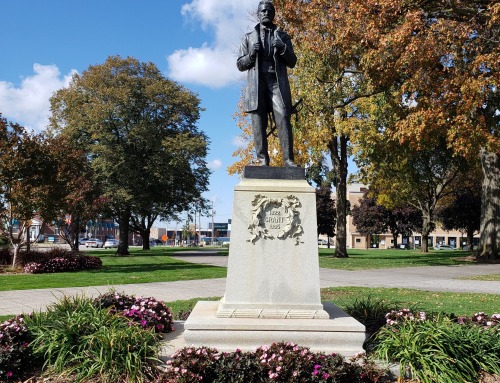A host of Michigan women have made their mark in the world, and I have written articles on several of them. This month I have found yet another remarkable woman from Michigan. Matilda Dodge Wilson was one of the world’s wealthiest women of the time, but she was also one who embodied hard work and led by example, despite much adversity. One of her quotes to live by was, “To attempt great things is to expect great things.”
Matilda’s Early Years
Matilda Dodge Wilson was born Matilda Rausch on October 19, 1883, in Walkerton, Ontario to German immigrants. The family lived on a sheep farm but moved to Detroit in 1884. There, her father ran a saloon, while her mother ran a boarding house next door. Matilda had one younger sister, Amelia. The girls attended Detroit Public Schools, then Matilda graduated from Gorsline Business College, also in Detroit.
Marrying John Dodge
Matilda’s life would change forever in 1902 when she began working as a secretary for the Dodge brothers at their new Dodge Motor Company. She became close with the older Dodge brother, widower John, and the two married in 1907. A year later, the couple bought a 320-acre farm near Rochester named Meadow Brook. This was the first purchase of nine farms that the couple would buy to add to the original Meadow Brook Farm.
The couple had three children together, Frances born in 1914, Daniel in 1917, and Anna Margaret in 1919. Matilda spent her time raising the children and managing two households, Meadow Brook Farm and another home on Boston Boulevard in Detroit. Then, in 1919, the couple began building a mansion in Grosse Pointe near the home of John’s brother, Horace, and his wife, Anna. In her spare time, Matilda explored her interests in history, arts, and culture, as well as agriculture. She also became active in public service.
On January 14, 1920, John traveled to New York City to attend an auto show. While there he contracted influenza and died, leaving 37-year-old Matilda a heartbroken widow. John also left three adult children from his previous marriage, Winifred, aged 26, Isabel, aged 24, and 22-year-old John. Matilda inherited her husband’s shares in the Dodge Brothers Company, which by then was becoming very successful. Despite the pain of her loss, Matilda continued her charitable work.
Ownership of Dodge Brothers
That December, John’s brother, Horace died of cirrhosis of the liver while in Palm Beach, Florida. Matilda and Horace’s widow, Anna, were now in control of the multi-million-dollar company. They agreed to appoint Frederick Haynes as the company president.
Tragedy struck yet again in 1924 when Matilda’s four-year-old daughter, Anna Margaret, died following complications from measles. I wonder sometimes if so much loss contributed to the sisters-in-law’s decision to sell their business a year later. Matilda and Anna sold Dodge Brothers Motor Car Company for $146 million, which was the largest cash sale of an American company up to that point.
Becoming Matilda Dodge Wilson
Matilda continued to serve others, including those at the First Presbyterian Church in Detroit. It was there that she met and befriended lumber broker Alfred G Wilson. Their feelings of friendship evolved into a love so they were married on June 29, 1925. They chose to live in the farmhouse on the Meadow Brook property, as Matilda preferred the country to the city. Matilda also no longer wanted to continue building the mansion she and John Dodge had started in Grosse Point because of disputes with her stepchildren and what she perceived as the snobbery of the Grosse Point Society.
Developing Meadow Brook
During the 1920s, Matilda met a young agricultural agent by the name of John Hannah. It was just after her marriage to Alfred that John helped Matilda in the development of Meadow Brook’s poultry stock. He continued to help her establish a viable, working farm.
A year later, Alfred and Matilda started building a Tudor-revival-style mansion at Meadow Brook Farm. Matilda herself supervised most of the details for the manor and new farm buildings. It was completed in 1929 and is now known as one of America’s castles. She had also begun to expand her farm stock of Guernsey and Hereford cattle, draft horses, and pigs at this time. By World War II, the farm consisted of 2,600 acres and employed 20-40 workers depending on the season. It became a self-sufficient estate and one of the United States’ largest agricultural enterprises.
A Woman Rising to Prominence
Being the caring person she was, Matilda, along with Alfred, opened their homes and hearts in 1930 by adopting two children. Richard, age 18 months, and his 3-month-old sister Barbara. Yet, Matilda continued to serve others despite her busy life at home.
Throughout her lifetime, she supported more than 40 organizations. In 1931, Matilda became Chairman of the Board at Fidelity Bank and Trust Company, and Time Magazine named her The Most Prominent Woman in US Banking. She was also elected to the State Board of Agriculture, the Governing board of Michigan State University, and served as a trustee of the college from 1931-1937. She was even named Trustee Emeritus in 1960.
In 1940, Matilda made history when she was appointed Lieutenant General. As a Republican, she was the first woman Lieutenant Governor of a US state. She worked under Governor Luren Dickenson for a six-week term, from November 19 to December 31. Many challenged the appointment, but she swore to do whatever needed to be done. Her term was fairly uneventful.
Birth of Oakland University
In 1941, Matilda’s old friend John Hannah had become the president of Michigan State University, so Matilda became an active supporter of the Agricultural school. In 1957, she donated Meadow Brook Hall and its surrounding property to the state to fund a Michigan State University in Oakland. This is now Oakland University. In keeping with her generous spirit, Matilda gave each member of the first graduating class, the class of 1963, a diamond ring.
Tragedy Strikes Again
Sadly, adding to Matilda’s tragedies, her only biological son, Daniel, died on August 15, 1960, while on his honeymoon. Some reports contend that he thought he was holding a candlestick, but it was actually an explosive. The inflammable went off in his hand and he fell from the boat he was on and into the water. Later reports say there was no explosion, but the boat lurched and caused him to fall overboard. Regardless of the cause, many said that Matilda was never the same after her son’s death.
Matilda’s second husband died on April 6, 1962, and she received most of Alfred Wilsons estate. In 1953, Matilda and Alfred had constructed a smaller home on their farmland at Meadow Brook as a retirement home and guest house, so a year later, she moved into this house where she was able to live alone. In 1967, Matilda traveled to Belgium to tour horse breeding farms, in search of new blood for her line of Belgian draft horses. She died there on September 19 at age 83.
Matilda Dodge Wilson had much loss in her life, yet this vivacious woman always pressed on. Her deep religious convictions led to the greatest gift she had to give, love, which led her to have a generous impact on many. “To attempt great things is to expect great things,” was certainly something she attained as her contributions continue to help others to this day.







Leave A Comment
You must be logged in to post a comment.